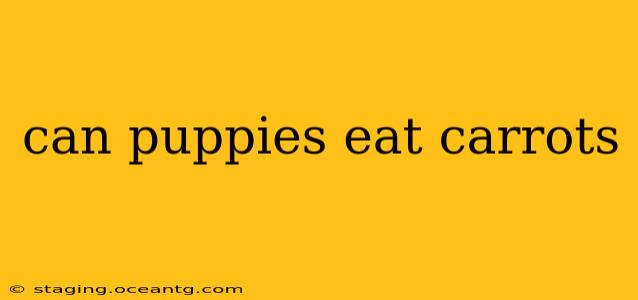Carrots are a crunchy, colorful vegetable enjoyed by many humans, but are they safe for our furry friends, especially puppies? The short answer is: yes, generally, puppies can eat carrots, but with some important caveats. This guide will delve into the nutritional benefits, safe preparation methods, potential risks, and frequently asked questions surrounding carrots and puppies.
What are the Benefits of Carrots for Puppies?
Carrots offer several nutritional benefits for puppies. They are a good source of:
- Fiber: Essential for healthy digestion and preventing constipation, a common problem in puppies.
- Beta-carotene: This converts to Vitamin A in the body, crucial for vision, immune function, and healthy skin and coat.
- Antioxidants: These help protect cells from damage and contribute to overall health.
- Vitamins and Minerals: Carrots contain small amounts of various vitamins and minerals, including Vitamin K, potassium, and biotin.
These nutrients contribute to a puppy's overall growth and development, supporting a strong immune system and healthy bodily functions.
How Should I Feed Carrots to My Puppy?
While carrots offer benefits, proper preparation and serving size are crucial. Here's how to safely feed carrots to your puppy:
- Wash thoroughly: Always wash carrots thoroughly to remove any dirt, pesticides, or bacteria.
- Cut into small pieces: Large pieces can be a choking hazard for puppies. Cut carrots into small, manageable pieces suitable for your puppy's size and chewing ability. Think small, bite-sized pieces or even finely grated.
- Cooked or raw?: Both cooked and raw carrots are safe for puppies. Steaming or lightly boiling softens them, making them easier to digest, especially for young puppies. Raw carrots offer a good source of fiber and provide a satisfying chew.
- Moderation is key: Carrots should be a treat, not a staple in your puppy's diet. Too many carrots can cause digestive upset or diarrhea. Introduce them gradually and monitor your puppy's response.
Are There Any Risks Associated with Feeding Carrots to Puppies?
While generally safe, there are some potential risks to consider:
- Choking hazard: As mentioned earlier, large pieces of carrots can pose a choking hazard. Always cut them into appropriately sized pieces.
- Digestive upset: Overfeeding carrots can lead to diarrhea or upset stomachs. Start with small amounts and gradually increase the quantity as tolerated.
- Sugar content: While not overly high, carrots do contain sugar. Monitor your puppy's weight and adjust carrot intake accordingly to prevent weight gain.
- Pesticide residue: Ensure you thoroughly wash the carrots to minimize exposure to pesticides. Organic carrots are a safer option.
How Many Carrots Can My Puppy Eat?
There's no set amount of carrots that's suitable for all puppies. The appropriate amount depends on your puppy's size, age, breed, and overall diet. A good rule of thumb is to treat carrots as a small, occasional snack, rather than a significant part of their daily meals. Consult your veterinarian for personalized guidance on appropriate treat amounts.
Can Puppies Eat Carrot Tops?
No, it's best to avoid feeding your puppy carrot tops. These contain compounds that can be toxic to dogs, potentially leading to digestive upset or other adverse reactions. Stick to the carrot itself for a safe and healthy treat.
My Puppy Has a Sensitive Stomach. Should I Avoid Carrots?
If your puppy has a sensitive stomach, introduce carrots gradually and in small quantities. Observe your puppy for any signs of digestive upset, such as vomiting, diarrhea, or changes in stool consistency. If you notice any adverse reactions, discontinue feeding carrots and consult your veterinarian.
Conclusion:
Carrots can be a healthy and enjoyable treat for your puppy, offering valuable nutrients when given in moderation and prepared safely. Remember to always wash them thoroughly, cut them into small pieces, and monitor your puppy for any adverse reactions. If you have any concerns, consult your veterinarian for personalized advice on incorporating carrots into your puppy's diet. Enjoy the crunch!
